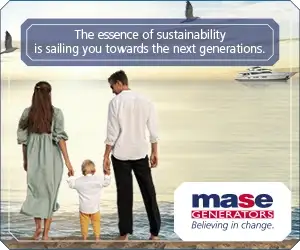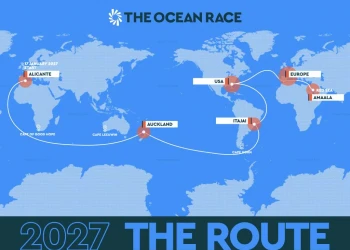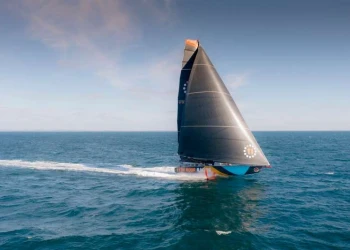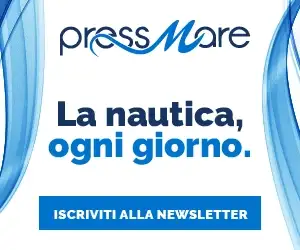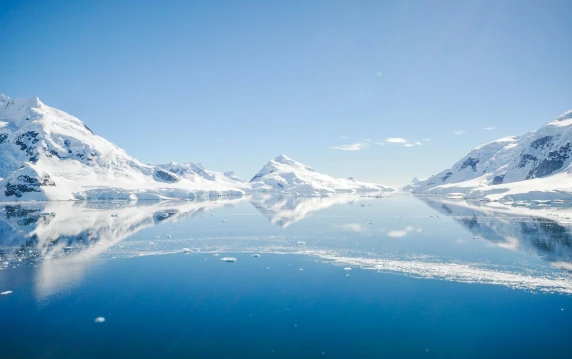
Data revealing insights into the health of the ocean will be collected from remote areas of Antarctica © Photo by henrique setim on Unsplash
The Ocean Race gathers critical polar ocean data from Antarctica and the Northwest Passage
The Ocean Race is providing critical data to international scientists studying the impact of climate change and plastic pollution on ocean health.
Following the 2022-23 edition of the around the world race, when all five IMOCA racing boats gathered over 4.3-million data points, The Ocean Race has continued this important work, extending the initiative to two polar expeditions - one in the deep southern waters and another in the high northern latitudes.
Earlier this year, The Ocean Race set up The Ocean Race Science Instruments on an Antarctica expedition sailing vessel that ventured from the Falkland Islands deep into the icy waters around Antarctica. The Ocean Race installed the equipment, trained the crew on its operation, and is managing the logistics for the data and sample collection and delivery to scientific organisations.
The expedition reached a part of the ocean that has been under-sampled due to its remote location and the relatively small number of vessels who travel these waters. In this case, the sailing vessel was able to collect samples south of 73-degrees south latitude, near Smyley Island, where the seawater temperature is actually just below 0-degrees celsius.
The Ocean Race Science Instruments used in the Antarctica expedition gathered information on marine microplastics, ocean carbon dioxide and oxygen levels, seawater temperature and salinity. Much of the data collection took place through breaks and gaps in the sea ice off the Antarctic peninsula, and is likely the first time this area has been sampled.
The samples are now en route to Europe where the National Oceanography Centre (NOC) in England will begin analysis. The carbon dioxide samples will be analysed by The GEOMAR - Helmholtz Centre for Ocean Research in Kiel, Germany, among others.
“This mission to Antarctica was a successful pilot mission to take The Ocean Race Science Instruments and utilise them on unique non-race boats, to gather information from the edges of the world to share with the scientific community. It would not have been possible without the commitment and co-operation with some of the world's most experienced polar sailors, to whom we are very grateful,” said Richard Brisius, the Race Chairman of The Ocean Race.
“The Southern Ocean around Antarctica is not just the heart and soul of our race, but as we are learning from leading scientists, it is a critical driver of climate, and one of the world’s bulwarks against the impacts of climate change. But due to its remoteness, the waters around Antarctica and especially under the ice pack near the continent, are rarely sampled or researched."
The Ocean Race Science Instruments will now be installed on an Arctic exploration sailing vessel making a summer transit of the Northwest Passage, departing from Bergen, Norway, in June, for a three-month expedition, led by accomplished polar explorer Keith Tuffley, with scientific counsel from Professor Dr. Johan Rockström, Director of the Potsdam Institute for Climate Impact Research, and two oceanography students from the University of Bergen leading the crew. A film team from Brazil, specialising in adventure filmmaking will document the journey.
The inclusion of The Ocean Race Science Instruments on board will allow for some of the first testing for microplastics in the region. Samples and data will be collected and shared with international ocean science organisations like the National Oceanography Centre for analysis.
"These expeditions are an opportunity to build on what we do during The Ocean Race and provide rare data to the scientific community," Brisius added. "We look forward to seeing how the samples and data that are collected contribute to our global understanding of these sensitive but important environments.”
As The Ocean Race builds its science programme on the water, it will continue to collaborate with leading international organisations to advocate on ocean health.
As part of the IOC UNESCO Ocean Decade Week in Barcelona this month, The Ocean Race will co-organise with IOC UNESCO a session called ‘Sailing into the Future for the Ocean Decade’, on Tuesday 9 April.
The event will gather thought leaders and changemakers from the world of science, research, policy and sailing, including IMOCA skippers and veterans of The Ocean Race, Boris Herrmann (Team Malizia) and Rosalin Kuiper (Team Holcim PRB) and feature hosted panels entitled: 'Offshore Racing and Science' and 'Understand our Ocean'.
The Ocean Race is committed to the race for the ocean and the science programme is an important initiative driving meaningful change towards the restoration of ocean health.

